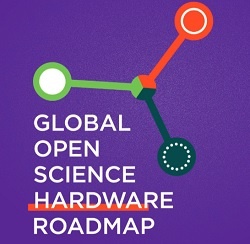Global Open Science Hardware Roadmap


GOSH Roadmap: launching a revolution in access to scientific tools
Over 100 researchers, engineers, educators, entrepreneurs and community organizers from 30 countries have published a report describing the steps for providing global access to scientific hardware by 2025 through open source designs, collaborative research and new manufacturing techniques, including 3D-printing.
__________________________________________________________________________________________
The authors of the ‘Global Open Science Hardware Roadmap’ lay out the steps they think are needed to help their community move forward, including greater institutional support from universities, funders and governments who often prefer inventors to patent their hardware. Report contributor Dr Max Liboiron published an academic paper about her attempts to ensure her low-cost device for sampling marine microplastic pollution was freely accessible to the Indigenous populations she works with in northeast Canada. Several others make the case that open sharing is compatible with selling products and could in fact bring new opportunities for entrepreneurs. Jorge Appiah, an engineer and innovator who founded the Kumasi Hive makerspace in Ghana, believes that open sharing reduces the cost of entrepreneurship in an African context and allows “rapid scaling of impact solutions through location innovation, application innovation, and incremental innovation”. This is supported by over fifteen startup companies who are successfully producing open hardware for science.
The ‘Global Open Science Hardware Roadmap’ report also tackles the need to ensure quality control and standards compliance, particularly to help reproducibility of science, which has been a major concern in recent years. Licensing, high-quality documentation and the social and ethical aspects of scientific work are also considered:
“Scientific tools are not esoteric and boring pieces of technology that have no connection to our daily lives. Who can use them, how they’re used and the results they provide can affect progress in developing new medicines, responses to environmental disasters and educating the next generation of scientists and technologists: so we have to take a wider view”, - explained author Dr Jenny Molloy from the University of Cambridge.
There are ongoing efforts to spread the benefits of open hardware globally. TReND Africa, for example, have led workshops teaching over 24 African scientists how to build their own 3D-printers and lab equipment at as little as 1% of the cost of commercial alternatives and achieve control over how they design their experiments.
Activity in Africa looks set to increase with the first Africa Open Science and Hardware Summit that took place in Ghana in April 2018 “OScH is a powerful tool to reduce the gap between theory and practice in African Higher Education but we should be careful about the neocolonialism driven by technology”, - reflects co-organiser and report author Thomas Herve Mboa Nkoudou, who is President of the Association for the Promotion of Open Science in Haiti and Africa (APSOHA).
After issuing this report, the group is planning to move forward their plans for scaling both the community and the reach of open hardware distribution at the Gathering for Open Science Hardware 2018 in Shenzhen, China which is a UNESCO Creative City and has been described as the “Silicon Valley for hardware”.
If you're interested in open research tools and specifically hardware, there are just a few days remaining to apply for the Gathering for Open Science Hardware (GOSH) taking place over four consecutive days 10-13 October 2018 in Shenzhen, China. The deadline for applications is 20 May 2018 and invitations will be sent out by mid-June 2018. You can APPLY DIRECTLY HERE. |

Related:
- International Data Week 2018 (Botswana, 5-8 November, 2018). Consult the Accepted Sessions
- The University of the Free State Library and Information Services, the Academy of Science of South Africa (ASSAf) and the Library and Information Association of South Africa (LIASA) (Free State) would like to invite You to a WORKSHOP intended to create awareness about Open Science and Open Data amongst Librarians: Date: 13 July 2018, Time: 08:00 to 11:30, University of the Free State, Bloemfontein Campus, REGISTER HERE
- TWAS offers fellowships to young scientists in developing countries to enable them to spend three to 12 months at a research institution in a developing country other than their own. The purpose of these fellowships is to enhance the research capacity of promising scientists, especially those at the beginning of their research career, helping them to foster links for further collaboration. Application Deadline: 1 October, 2018. APPLICATION DETAILS.
- Open Science MOOC
- Basics of Design Research (Edition Q2/2018): Before you start designing, get to know your user and what they need – join this free online course to learn how (OpenSAP)
- AfricaConnect2 : towards high-capacity internet networks for research and education across Africa
- FAO Mobile phone App to monitor & combat Fall Armyworm

To keep up-to-date with AIMS news, please, Sign up for AIMS Newsletter, follow @AIMS_Community on Twitter.

